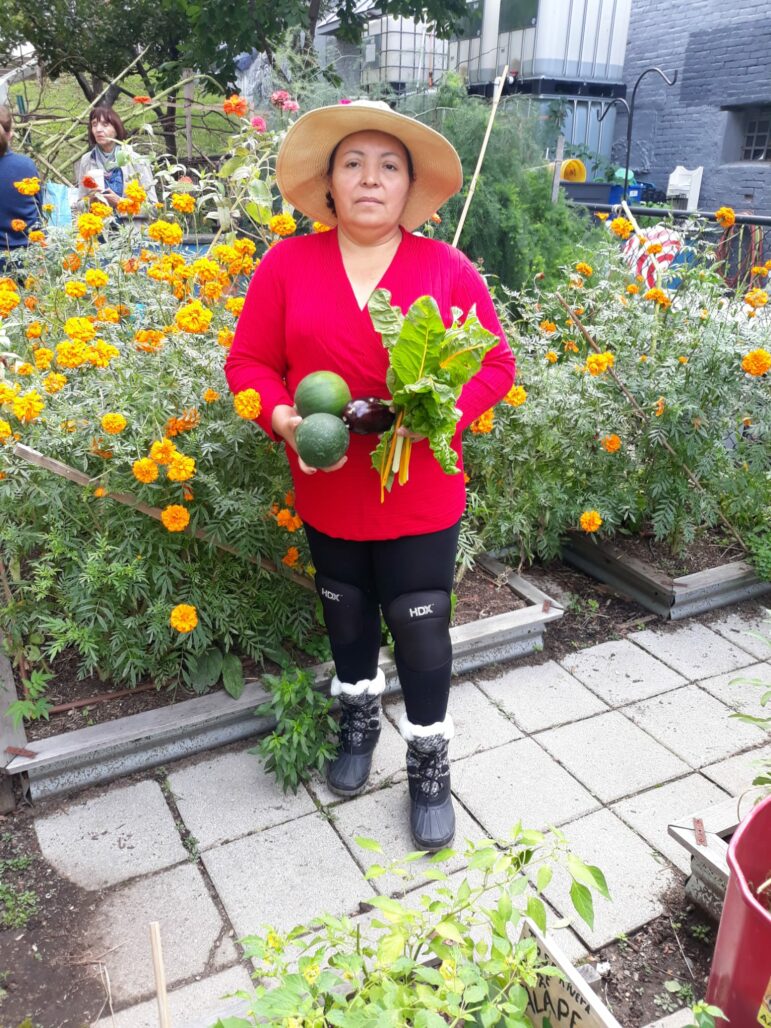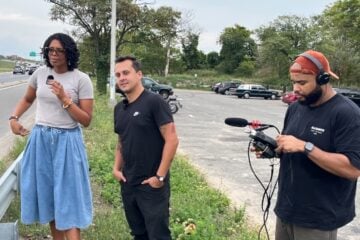GBH partners on podcast, radio show that provides reliable health information to Spanish-speaking audiences

Elvis Jocol
"Salud" host Tibisay Zea interviews Rosenda Arrecís.
During the COVID-19 pandemic, Tibisay Zea noticed that health misinformation was increasingly circulating within Hispanic communities throughout the U.S. Social media platforms were spreading inaccurate news about the virus, the effects of the vaccine, and possible cures.
Zea, a bilingual Venezuelan journalist based in Boston, was also concerned that Spanish speakers were disadvantaged because most COVID-19 information was in English. Though six in 10 U.S. adult Hispanics speak English or are bilingual, many Latino immigrants communicate only in their native language. There is a “lack of high-quality health information in Spanish, especially for immigrants,” Zea said.
During 2020, Zea focused on covering COVID misinformation in her role as a reporter for Boston’s El Planeta, a Spanish-language newspaper. She then received a $10,000 grant from the International Center for Journalists to produce four episodes of Salud, a podcast about underreported health issues in the Hispanic community.
With the participation of Boston’s GBH, Salud is now expanding and moving to radio as well. The station is contributing production and marketing resources to support eight more episodes of the show. Experts from Harvard Medical School and the Boston Public Health Commission also serve as advisors.
“What distinguishes this effort and makes this collaboration so exciting is that Salud is one of the first health-care podcasts to serve Spanish-speaking listeners directly and which distributes information by leveraging relationships with local community groups,” said Zea, who hosts the podcast. Since January, she has also reported for The World, the radio show co-produced by GBH and PRX.
“We are thrilled to see GBH on board empowering our community to become a catalyst to prosperity for America,” said Javier Marin, CEO of El Planeta.
The secrets of longevity
Zea and her producer, El Planeta’s Claudia Ginestra, develop topics for Salud by consulting with advisers from Harvard on health problems most affecting the Hispanic community. They then look for compelling stories from Spanish-speaking immigrants with relevant experiences.
The current season’s first episode highlighted the stories of Rosenda Arrecís, a woman from Guatemala who recently celebrated her 102nd birthday, and Angela Alvarez, a Cuban singer nominated for a Latin Grammy at 95, who shared their secrets of long life. “The secret is to behave properly, care for one another and avoid fighting,” Arrecís said.

Salud caters to a growing potential audience. The Spanish-speaking community represents 18% of the total U.S. population, with 62.1 million people, according to the 2020 census. By 2060, one in four individuals in the U.S. will identify as a person of Hispanic heritage.
The audience also shows loyalty to the medium of radio. According to Nielsen, 98% of Hispanics age 15 or older in the U. S. listen to the radio weekly, compared to 93% of Americans overall. “This must be because many have more than one job, and the radio allows you to multitask,” Zea said. “You can listen to it while you are at work or commuting to your workplace.”
While still available as a podcast, Salud debuted on GBH’s 89.7 FM Oct. 22. The half-hour show airs at 9:30 a.m. Saturdays, replacing the last half hour of Weekend Edition Saturday for eight weeks.
“We are also marketing the podcast across all of GBH’s distribution channels, leveraging relationships with local Latino community groups, running targeted social media advertising, reaching out to Spanish-language press outlets, and planning an in-person event,” said Pam Johnston, GM for news at GBH.
Meanwhile, El Planeta is promoting Salud to its audience in a very Hispanic way. “We know that Spanish-speaking communities love concerts — for example, Karol G or Marc Anthony,” Zea said. “So El Planeta holds raffles for free tickets through quizzes whose questions are about the content of the podcast.”
The collaboration with El Planeta and Harvard Medical School “allows us to super-serve the local and national Hispanic communities with in-depth stories of significant importance to their health and well-being,” said Johnston, who adds that she sees Salud as “an offering for a national audience.”
“Bringing these stories to the audience in their native language further reflects our deep commitment to engage with a broad and growing range of listeners,” she said.
Global ambitions
For Zea, the partnership with GBH is only the beginning for the new phase of Salud. Hispanics abroad who lack socioeconomic opportunities also have difficulty accessing health services and adequate information in their home countries. Though Salud now focuses on immigrants in the U.S., Zea wants it to inform Hispanics across Latin America and worldwide.
“Our mission will be to reach the entire Spanish-speaking community, and I am committed to doing that,” she said.
The partners behind Salud will evaluate its performance during this initial phase before deciding how and whether it will continue. “We are all interested in learning more, iterating, and evolving together,” said Johnston.





